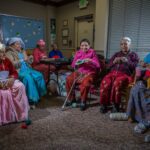Asylum seekers and refugees frequently suffer from post-traumatic stress and culturally sensitive methods towards reducing symptoms should be taken into account. The aim of the work reported was to examine the effectiveness of Culture-Sensitive and Resource Oriented Peer (CROP) Groups for Chechen asylum seekers and refugees towards reducing post-traumatic symptoms, anxiety, and depression. Some 94 participants were randomly assigned to 15 sessions of CROP or Cognitive Behavior Therapy (CBT) Groups, to 3 single sessions of Eye Movement Desensitization and Reprocessing (EMDR), or to a Wait-List (WL). The results indicated that CROP was significantly superior to WL, and was equally effective as CBT in reducing post-traumatic symptoms, anxiety, and depression. Improvements still were present at three and six month follow-up occasions. EMDR yielded negative results. According to this pilot study, CROP-Groups pose a promising, culturally sensitive alternative to psychotherapy with Chechen migrants.
The home environment and Asian immigrant children’s early literacy skills
Objective.The current study examines how aspects of the home literacy environment were related to Asian immigrant children’s early literacy skills.Design.One hundred and thirty-nine Asian immigrant

